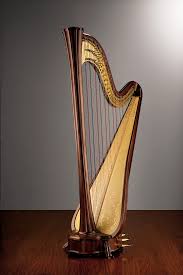记忆方法
1. sharp => harp.
2. harmony + piano => harp.
3. har- (谐音“哈”----哈里王子、哈数、哈利波特-----“竖、立”) + piano => harp: 竖立着的琴。
4. ha (谐音“哈”) + r (花儿,一朵亭亭玉立、竖立鲜花儿) + piano => harp: 哈,像鲜花儿一样亭亭玉立、竖立着弹奏的琴。
5. 哈花---哈尔滨的花儿----哈尔滨的花儿,在冰雪中亭亭玉立。
2. harmony + piano => harp.
3. har- (谐音“哈”----哈里王子、哈数、哈利波特-----“竖、立”) + piano => harp: 竖立着的琴。
4. ha (谐音“哈”) + r (花儿,一朵亭亭玉立、竖立鲜花儿) + piano => harp: 哈,像鲜花儿一样亭亭玉立、竖立着弹奏的琴。
5. 哈花---哈尔滨的花儿----哈尔滨的花儿,在冰雪中亭亭玉立。
中文词源
harp 竖琴
来自古英语hearpe,来自Proto-Germanic*harpon,竖琴。可能来自PIE*serp,弯,转,弯钩,词源同serpent,harpoon.因其同源词也包含折磨用的刑具。
英语词源
- harp (n.)
- Old English hearpe "harp, stringed musical instrument played with the fingers," from Proto-Germanic *harpon- (cognates: Old Saxon harpa "instrument of torture;" Old Norse harpa, Dutch harp, Old High German harpfa, German Harfe "harp") of uncertain origin. Late Latin harpa, source of words in some Romanic languages (Italian arpa, Spanish arpa, French harpe), is a borrowing from Germanic. Meaning "harmonica" is from 1887, short for mouth-harp. The harp seal (1784) is so called for the harp-shaped markings on its back.
- harp (v.)
- Old English hearpian "to play on a harp;" see harp (n.). Cognate with Middle Dutch, Dutch harpen, Middle High German harpfen, German harfen. Figurative sense of "talk overmuch" (about something), "dwell exclusively on one subject" first recorded mid-15c. Related: Harped; harping.
权威例句
- 1. Some of the instrumentation is exquisite, particularly for harp and flute.
- 有些器乐段落谱写得非常优美,尤其是竖琴和长笛的部分。
- 2. Nell was plucking a harp.
- 内尔在弹奏竖琴。
- 3. a concerto for flute and harp
- 长笛与竖琴协奏曲
- 4. She swept her fingers over the strings of the harp.
- 她用手指划过竖琴的琴弦.
- 5. He played an Irish melody on the harp.
- 他用竖琴演奏了一首爱尔兰曲调.

